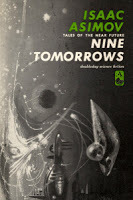The Jolt of the Weird
 Some real SF in this oneA spaceship doesn't make it science fiction.
Some real SF in this oneA spaceship doesn't make it science fiction."What if?" makes it science fiction.
If a story doesn't ask that question, it can't be science fiction, no matter how many hyperspace jumps it takes or alien telepaths it includes. Instead, it is science fiction's prettier, somewhat dimmer cousin - space opera. People associate space opera with blazing blasters, robots galore, fifty-eight different alien species on any given planet, and vast galactic empires. But really, space opera is just science fiction with the extrapolation removed.
Does this difference even matter? After all, if genre classification is a tricky beast, subgenre typology is a super-evolved mutant chameleon. It's the stuff of endless, tedious late Saturday night nerd-offs. The eyes glaze over, the head droops, and before you know it, you're in an alcoholic semi-slumber as two sophomores with skin problems thrash out the subject until they close the Loscon hospitality suite.
But if you're a spec-fic writer or other storyteller, it is important, because most of what people now consider to be science fiction is actually space opera. Star Wars, Star Trek, Babylon 5, Doctor Who - they're all space operas, instead of straight-up science fiction. If you're going to pitch either genre, you should know the difference.
Obviously the same writer can write both. And some franchises, like the original Star Trek, veer from one to the other and back. When Heinlein wrote Methuselah's Children, he was writing science fiction - even if it was also adventure fiction. ("What if civilized human beings suddenly discover that their next-door neighbors will live five times longer than they? Will their civilization hold, or break?") When he wrote Double Star, that was space opera (but a lot of fun). Maria Doria Russell's superb novel The Sparrow is pure science fiction, even though advanced technology barely makes an appearance; Lois McMaster Bujold's equally terrific Vorkosigan Saga is almost pure space opera (with one or two exceptions, like the social structure of the planet Cetaganda).
Space opera is fun; I truly enjoy it. But the one thing it cannot deliver, that only science fiction can give, is the authentic jolt of the weird. If the story twists your brain; if it shows you a rational, utterly alien possibility based on the logical extrapolation of a premise - that jolt is the sign that you're encountering real science fiction.
Look for it. It's hard to find, but it's worth it.
Published on January 26, 2013 20:18
No comments have been added yet.



